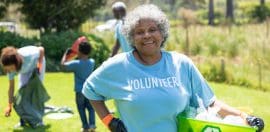National Volunteer Week shines a spotlight on volunteers

16 May 2022 at 3:17 pm
National Volunteer Week is a great opportunity to acknowledge freely given effort, but the nature of volunteering is evolving, writes Volunteering Australia CEO Mark Pearce.
Every year in May, we celebrate National Volunteer Week. Throughout Australia, in our cities and regions, we hold events and recognise the special relationship volunteers have with their communities. We thank them for their commitment and passion, which contributes to our quality of life.
Volunteering is a deeply personal experience. When we volunteer, we offer our most valuable asset – our time – in order to render the otherwise impossible, possible. Through our volunteering we enrich the lives of others, we strengthen our society, and we build the connectedness of our communities. Volunteers better their own lives by bettering the lives of others.
More than five million Australians volunteer their time through organisations, into community each year. Despite the volunteer workforce’s size, and notwithstanding the manifold benefits volunteering delivers to our society and our economy, it’s not well understood and even less well acknowledged and resourced.
Volunteers and their extraordinary contributions make the news from time-to-time. When rivers burst their banks, when fire ravages our increasingly fragile ecosystem and destroys homes and lives, and when the predictable rhythm of daily life is disrupted by crisis justifiably we acknowledge volunteers.
While the contribution of volunteers isn’t always front-page news, it is always there. No matter whether times are good or bad, volunteers lie at the heart of building and maintaining strong, resilient communities. Community sport wouldn’t take place without volunteers. More than three million, invariably un-celebrated, volunteers ensure we and our friends and family can take to arenas and fields to enjoy the benefits of exercise. Volunteers are actively involved in health care and aged care, in animal welfare and environmental protection, in emergency and crisis response and community resilience, to highlight just a small fraction of the myriad ways volunteers form the fabric of our society.
It’s not always glamorous, but it is always valuable and meaningful – to the beneficiaries in the community and to the volunteers who make these things possible.
Our new report, Volunteering and Australia’s crisis resilience, aims to demonstrate the volume and breadth of how volunteers play crucial roles in communities during natural disasters, and COVID-19 outbreaks.
While the efforts of volunteers in crisis response and recovery are widely known, volunteers also contribute significantly to prevention and preparedness. Over one million volunteers support Australia’s crisis resilience and are the country’s backbone during crisis and emergency. This resilient and skilled workforce includes over 200,000 volunteers in fire services organisations, and around 25,000 volunteers in the State and Territory Emergency Service. An additional 200,000 volunteers are engaged in over 1,000 registered emergency and relief charities.
Furthermore, many thousands of often “invisible” volunteers help informally and spontaneously to support communities, before and after crises. Volunteers are a vital part of the nation’s workforce, but are often taken for granted because they go unnoticed. By shining the spotlight on volunteers across the community, we can better incorporate volunteers in all levels of planning, and properly support and acknowledge their work.
The ever-evolving complexion of Australian communities reflects the richness of increasingly diverse populations and the aspirations of residents. Volunteering has always been integral to connecting people and developing inclusive ways for communities to thrive. As communities change, so does the way volunteers participate within them.
The restrictions associated with the COVID-19 pandemic hastened changes which were already occurring in communities, and volunteers are increasingly looking for innovative ways to engage with them. Opportunities which provide volunteers with flexibility and choice are keenly sought by all ages and backgrounds, and organisations are considering how they can change their programs and processes in response.
As volunteering continues to evolve over time, we need to get better at understanding how volunteers contribute to community, and ensure volunteers don’t go unseen. This means we need better data to create a strong evidence base. The theme of this year’s National Volunteer Week is “Better together”, which recognises the power of volunteering to bring people together, build communities and create a better society for everyone.
We encourage all Australians to take some time this week to consider the innumerable benefits volunteering accrues to communities and volunteers alike. We also encourage everyone to “vote for volunteers” in this final week of the federal election campaign by contacting your local candidates and encouraging them to commit to a positive agenda on volunteering, including the implementation of the National Strategy for Volunteering currently in development.







